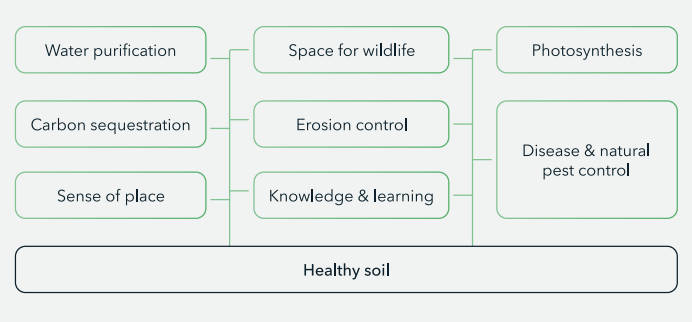Regenerative farming practices are increasingly recognized for their ability to enhance ecosystem services, support sustainable agriculture, and improve the overall health of the environment. HeavyFinance, in collaboration with farmers, is at the forefront of designing and implementing long-term agricultural land management practices that restore soil health and its dependent ecosystem services, such as biodiversity. This article highlights the co-benefits of these practices and their impact on the environment, plant, animal, and human health.

Restoring Soil Health and Ecosystem Services
At HeavyFinance we adopt a holistic and tailored approach to regenerative agriculture. Together with farmers, we focus on practices that aim to restore soil health and improve ecosystem services such as carbon sequestration, nutrient cycling, efficient photosynthesis, and water purification. Key practices include proper residue management, the use of cover crops, reduced tillage, and balanced nutrient management. These practices help build up processes that reduce topsoil disruption, minimise oxidation, and increase soil organic carbon sequestration.
Promoting Diverse Microbiomes and Nutrient Cycling
A primary goal of our carbon farming project is to cultivate balanced, healthy soils with diverse microbiomes. Healthy soils support improved nutrient cycling through practices such as crop rotation, incorporation of crop residues, and the use of animal manure. These methods ensure that a significant proportion of nutrients are returned to the soil system, enhancing soil fertility at different layers.
Moreover, HF assists plants in utilising atmospheric carbon and nitrogen by converting them into biologically bound forms in the soil. Plants fed with these biologically bound nutrients exhibit better uptake of essential minerals like calcium, magnesium, manganese, iron, and phosphorus. This not only boosts nutrient density but also enhances photosynthesis efficiency, leading to better transformation of CO2 into energy.
Reducing Synthetic Inputs and Environmental Impact
One of the standout benefits of regenerative practices is the reduction of synthetic inputs and fuel consumption.Minimising the use of synthetic nitrogen and phosphorus-based fertilisers, limits the mobility of these minerals in soil solutions, counteracting adverse environmental impacts such as leaching, volatilization, and NOx emissions. This approach helps prevent the pollution of water bodies and the resulting eutrophication, which negatively affects planetary health.
Improving Crop Nutrient Density and Human Health
The implementation of regenerative practices by farmers leads to healthier soils, which in turn results in higher nutrient density in produced crops. This improvement in soil health and nutrient cycling ensures that crops are rich in proteins and minerals, positively impacting human health. Consuming nutrient-dense grains and other crops supports better nutrition and overall well-being.
Enhancing Farmers' Knowledge and Wellbeing
Beyond environmental benefits, the HeavyFinance carbon farming program also aims to enhance farmers’ knowledge and technical capabilities in improved agricultural land management practices. This educational component aims to improve farmers’ livelihoods, mental well-being, and physical health. By reducing exposure to chemical inputs and fostering a renewed sense of purpose through collective climate change mitigation efforts, farmers gain a stronger connection to their land and community.
Implementation of regenerative farming practices demonstrate significant co-benefits across multiple dimensions, including ecosystem services, environmental health, and human well-being. By fostering sustainable agriculture, HeavyFinance is helping to create a resilient and productive agricultural system that benefits not only the environment but also the farmers and consumers who depend on it. Through these efforts, regenerative agriculture proves to be a crucial component in the fight against climate change and the promotion of global agricultural sustainability.

